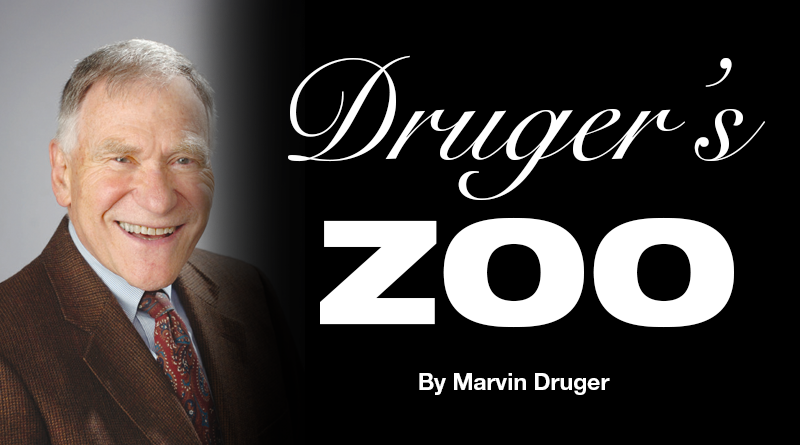Memorable Moments
By Marvin Druger Email: mdruger@syr.edu
Our mind is a complex, mysterious entity.
Somehow, we have the ability to remember things. Memories of information fade away, but memories of experiences linger.
My son, Bob, has undergraduate degrees in biology, psychology and chemical engineering from Syracuse University. He also has medical and Ph.D. degrees from Stony Brook University. He has been an ophthalmologist for many years and owns Druger Eye Care in Camillus. He specializes in cataract surgery.
He once jokingly told me, “I didn’t need all that education. All I really needed was to learn how to do cataract surgery.”
Like many professionals, he has to refresh his knowledge periodically, but he does remember experiences. We are basically the product of our experiences. We learn from everything that we do and everything that we do becomes part of who we are.
I earned a bachelor’s degree in biology from Brooklyn College and master’s and PhD degrees from Columbia University. I specialized in zoology (genetics) and minored in science education. I taught science, mostly introductory biology, at Syracuse University, for almost 50 years. I taught science to an estimated 50,000 students in my career. I retired in 2009.
One of my many activities was to organize a Saturday science enrichment program for talented students in the Syracuse area. Schools paid a fee and selected those student participants whom they felt would benefit most from the program. I recruited 10 science teachers or researchers to present three-hour sessions in a variety of sciences, including laboratory activities. There were many innovative features in the program and I conducted it for many years. The program was suspended several years ago because of the COVID-19 pandemic. Then, I decided to unretire and restore the program during the 2022-23 academic year.
Recently, one of my speakers backed out. She had post-COVID-19 health issues, but I had scheduled the session and I didn’t want to cancel it. The session was supposed to be in genetics, my area of education. My first reaction was to think, “I’ll do the session myself.”
I hadn’t taught since my retirement in 2009 and I couldn’t remember enough information about genetics to do the session. Perhaps, some of the information would come back to me, but I had no notes or references. I panicked for several days until I found a Ph.D. student in genetics to do the session. Whew!
What struck me was how much information had hidden itself in my mind. Yet, I recall all the details of this negative experience. How could I forget so much information after so many years of studying genetics?
Again, we forget information. We remember experiences. The weird thing about how the mind works is that we remember tiny, insignificant incidents for our entire lives. Most of our lives are a blur of memories of experiences.
Some are recurring and persistent. These memories are often random and we don’t know what triggers them at a particular time. I’ll mention a few of the random incidents that have become part of my psyche.
I remember my second grade teacher, Mrs. Davidson, grabbing my chin frequently and shaking it. “Be a good boy,” she said. I told my dear, deceased wife, Pat, “That’s why my chin looks this way.” Her response was, “How do you explain your nose?”
My father was in a hospital bed, dying from advanced prostate cancer. I visited him and he said to me, “I won’t see my Marvie anymore.” Those words still ring in my mind.
Pat was in hospice, suffering from advanced lung cancer. I took care of her at home for about three years. Finally, I realized that she needed hospice care and she went to Francis House hospice in North Syracuse. I thought, “She can spend some time here to speed up her recovery.” The hospice administrator approached me and said, “You know that she is not going to get better.” This remark sank into my mind. It was the first time that I realized that my precious love of almost 60 years was going to die.
Pat never complained about her illness. She just lived courageously and carried on. One day, I stood next to her bed and she said to me, “Marvin, please help me!” There was nothing I could do and I felt completely helpless. The memory of that remark is permanently engraved in my mind.
About a year after Pat’s death, I was checking out at Wegmans in Dewitt. An attractive lady was in front of me at the cashier. She was buying all sorts of foods that I never eat, i.e., shrimp, sushi, avocados, mushrooms, etc. I had a bag of lettuce. I said to her, “I only have a bag of lettuce. My wife died last year and I’m alone.” For some unknown reason, she pulled a business card out of her purse and said, “I’m alone too.”
I invited her to lunch and this started a relationship with Victoria that has lasted more than eight years. I am 20 years older than her, but she reassured me, “I like older men.”
My daughter said, “She’s after your money.” I told Victoria my daughter’s remark and she responded, “I am.” A few weeks later, I said to Victoria, “My daughter still thinks you are after my money.” Victoria’s response was, “You’re not worth it!” This series of incidents stand out in my mind.
I came to Syracuse in 1962. We wanted to buy a house. I remember standing in the back yard with my daughter and the owner of the house. He was an old man whose wife had died and he was moving to a smaller place.
He said to me, “There’s nothing wrong with this house.” I suddenly had a vision that many years later I would be standing in the back yard with some potential buyer and I would say, “There’s nothing wrong with this house.” That vision stays with me.
My family has been wonderful to me. They watch over me with passion. There have been many family incidents that stay in my memory and sustain me. Even so, I cannot erase memories of incidents with my wife and loneliness lingers. But I separate loneliness from solitude. I like solitude, but I don’t like loneliness. Reaching out to help others calms loneliness and my articles in 55 Plus magazine are intended to encourage people to think about their own lives and approach life with vigor. I feel good when someone sends me a positive email about my articles. By helping others, I help myself.
When I was a post-doctoral student with the Commonwealth Scientific Research organization at the University of Sydney, Australia, I was mentored by Dr. Jimmy Rendel. I did research in genetics. One day, I made an interesting observation and I wanted to tell Jimmy about it. He was in the tea room. I rushed to the tea room and Jimmy was lying on his back on a black leather couch with his arms folded across his chest. “Jimmy, Are you OK?” I asked. He barely moved his lips and said, “I’m pondering the definition of fitness.”
This incident was a revelation for me. How often do we stop our daily routine of activities to “ponder?” How often do we think about who we really are and what lies ahead?
I hope this article will cause you to “ponder the definition of fitness.” That incident is now part of my memory and is a guiding principle in life.

